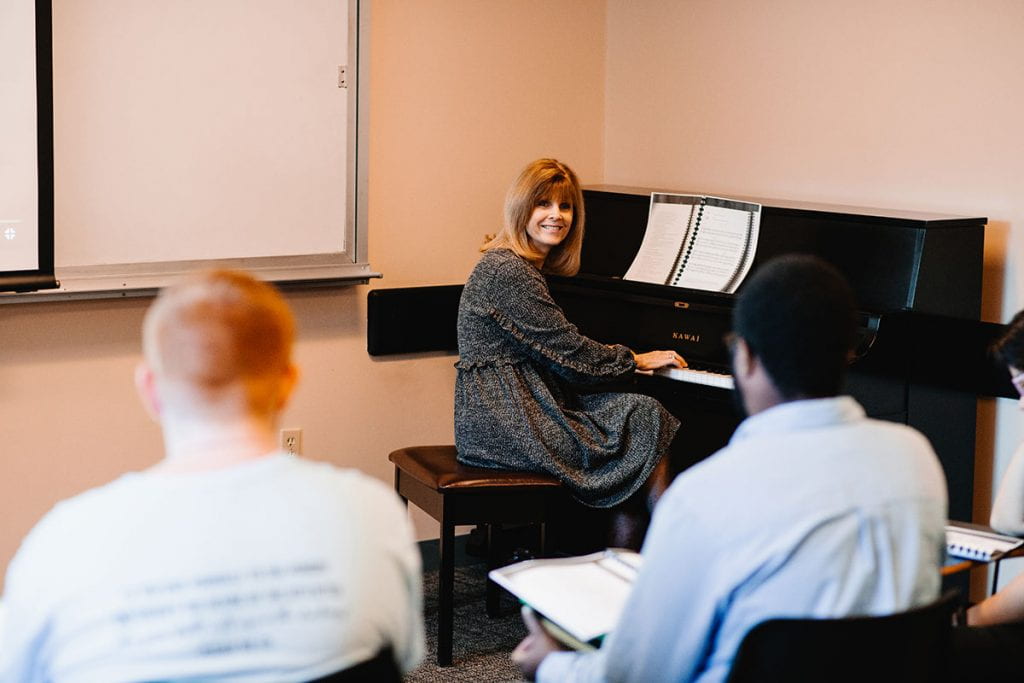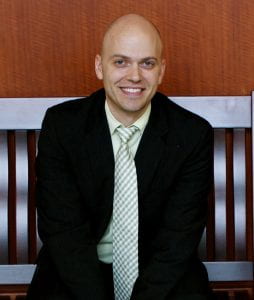PC establishes major in music technology and production
By Charlotte Smith ’20, ’21G
Beginning in the fall 2021 semester, the Providence College Department of Music will offer a new major and minor in the specialized and increasingly coveted field of music technology and production.
The music technology and production program will prepare graduates for careers in various fields that combine artistic, technical, and collaborative skills, including, but not limited to, media writing and production, audio engineering/editing and mastering, music synthesis and programming, and/or graduate study in music.

Students majoring in music technology and production will earn an undergraduate degree from the School of Arts & Sciences, to be completed in four years. PC will be one of the few liberal arts institutions in the Northeast to offer such a major.
The interest in creating this new major was sparked when Jo-Ann Thomas, visiting faculty in music education, began to urge other faculty members to develop courses in music technology to attract more students to the music department. Dr. Catherine Gordon, professor of music and department chair, responded to Thomas’ proposal and began brainstorming more on the idea. Her research indicated that both student interest in music technology and production and an industry demand for professionals in this area existed.
“Our research of several schools around the country that offer degrees in music technology and production shows an increase in the number of students in their music departments and schools of music after the addition of the degree in music technology. Research also shows that the demand for those with expertise in music technology is high in the music industry and in cable and specialty TV stations,” said Gordon.
The major combines a well-rounded music education curriculum with course work in digital audio and Musical Instrument Digital Interface production, or MIDI. All majors will be required to take music core classes (music theory and music history) so that they have a strong foundation in music as they develop expertise in various technical areas.
The courses in music technology and production have been developed to reflect the 21st-century means of making and producing music, according to Gordon. Some of these new courses include Song Writing, Commercial Arranging, and Music for Media. In order for students to be able to negotiate the current and future world of music, a knowledge of the connection between music and technology is a necessity, she said.
In addition, Gordon noted the music department is currently offering courses in jazz, popular music, music in world cultures, and guitar class. It is developing courses in popular music performance, film music, and music business to complement the music technology and production major. Students will be able to increase their knowledge of trends in the modern music industry and increase their exposure to different types of contemporary music.
Another exciting aspect of this new program is its creativity and flexibility, said Gordon. Students will learn hands-on skills that enable them to hone-in on their passion for music.
Currently, 19 students majoring in, or plan to major in, music. They includes future music technology majors, as well as current music, music education, and musical theater majors. The department offers a variety of music classes, averaging 20-25 students. The hope is that the addition of this major will see the music department’s student base grow and diversify. According to Gordon, there has been a strong interest for both a major and minor in music technology and production among PC students and prospective students.
“There are three rising juniors and, we believe, two sophomore students who will begin the degree next fall. Once we announced to several high schools in the Northeast that we were offering a major and a minor in music technology and production, we began hearing from a number of counselors and then high school students about the degree. In addition, a lot of students just want to take music technology classes, which they are welcome to do,” she said.
Dr. William Longo, adjunct faculty in music technology and production, teaches MSC 136, an Introduction to Music Technology course that has been offered the last three semesters. Longo has created and taught courses in music production and technology at several institutions and has extensive experience in composing, arranging, producing, and recording contemporary music projects. While Longo will do most of the music technology teaching, the department has requested a music technology lab supervisor who would teach two courses per semester and carry out the duties associated with being a supervisor.

“Music plays such an integral role in our lives. Whether we are streaming music and media, watching film or television, playing video games, or even using apps, everything has a musical component. The breadth and depth of skills developed in our music technology major will prepare students for jobs immediately out of college, and if so desired, will prepare students for further study at the graduate level,” Longo said.
He continued, “Our graduates could easily progress from this degree program to a master’s program in composition, where they may decide to focus on topics like film scoring, media writing, classical composition, or jazz composition. If students are more drawn to audio recording, editing, and mixing techniques, they will gain skills in these areas as well. This degree can really help students prepare to take that next step to explore exactly what they are interested in.”
Students in the program will have the opportunity to participate in music technology internships, which will give them that additional hands-on experience, said Gordon. Music technology faculty members hope to partner with the College’s information technology and media team in order to allow students to delve deeper into the field of technology.
“This degree is the perfect marriage of fostering creative composition skills while preparing students to manage technology used by professionals in the industry. Students will have the opportunity to develop their individual musical voice and learn how the creative process comes together, from demo to distribution, with the help of software and technology,” Longo said.





